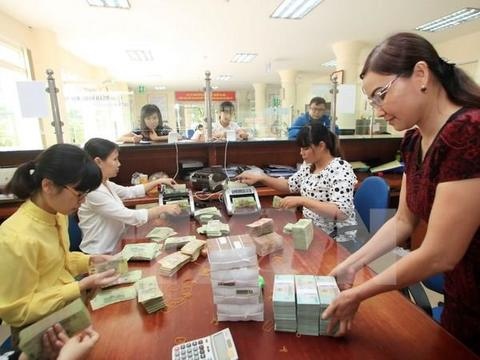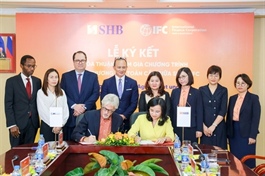VN targets 95 per cent of depositors to be fully insured by 2025
VN targets 95 per cent of depositors to be fully insured by 2025
The Government aims to increase the ratio of fully insured depositors out of total insured depositors to 92-95 per cent by 2025 to align with international practices.

Customers deposit at a bank in Hà Nội. The Government sets a goal to make 45 per cent of depositors grasp the core contents of the deposit insurance policy by 2025 and raise the rate to 50 per cent by 2030. — VNA/VNS Photo |
Under the strategy for deposit insurance development until 2025, with a vision towards 2030, the Government aims to ensure 45 per cent of depositors understand the core contents of the deposit insurance policy by 2025 and raise this percentage to 50 by 2030.
It intends to reduce the insurance payment deadline to 30 days by 2025 and 15 days by 2030 to allow depositors quicker access to their deposits when the insured institution is resolved.
According to the strategy, the charter capital of a deposit insurance organisation will be increased to VNĐ10 trillion by 2025 and VNĐ15 trillion by 2030.
Phạm Bảo Lâm, chairman of the board of directors of Deposit Insurance of Vietnam (DIV), stated that the strategy is designed to protect the legitimate rights and interests of depositors, actively contribute to maintaining the stability of the system of credit institutions and foreign bank branches, and ensure the safe and robust development of banking activities.
Additionally, he mentioned, it enhances the quality and effectiveness of deposit insurance activities, including issuing deposit insurance participation certificates, reporting information, supervision, examination, involvement in special control, detection and early warning of potential risks to insured institutions; engagement in effective restructuring of weak insured institutions; calculation and collection of deposit insurance premiums, capital management and investment, dissemination of deposit insurance policy, and reimbursement in line with international practices and provisions of Vietnamese laws.
The strategy aims to bolster the financial strength of the deposit insurer, affirm the State's commitment and enhance depositors' trust in the deposit insurance policy.
To achieve the strategic goals, Lâm emphasised the necessity to amend and supplement the Law on Deposit Insurance and its guiding documents, and to refine the financial regulations for the deposit insurer. This is crucial not only for deposit insurance activities specifically but also for fortifying the legal framework of the financial and banking industry as a whole.
Furthermore, the DIV will continually enhance the efficiency of its operations, which includes promoting digital transformation, applying modern information technology to all professional deposit insurance activities; implementing a reporting information system to ensure comprehensive and accurate information; conducting thorough examinations of insured deposits at 100 per cent of weak insured institutions based on monitoring findings; refining risk monitoring methods and indicators; and calculating and collecting deposit insurance fees.
The DIV will also seek to bolster its financial capability through measures such as proposing to increase charter capital, diversifying its capital portfolio, and securing loans from the State Bank of Vietnam (SBV) to affirm the State's commitment and boost depositors' confidence in the deposit insurance policy.
Currently, the DIV protects deposits at 1,283 insured institutions, including 97 banks and foreign bank branches, 1,181 people's credit funds, one cooperative bank and four microfinance institutions. These organisations have all received certificates of participation in deposit insurance and are levied and collected fees in accordance with the law.
By the end of 2022, the total capital of this agency had reached nearly VNĐ96 trillion, a 16 per cent increase from the same period the previous year. Of this, the professional reserve fund amounted to nearly VNĐ90 trillion, marking a rise of over 17 per cent compared to the same period in 2021.






















